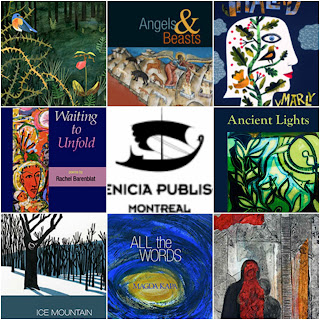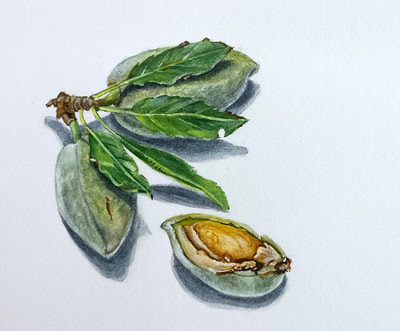 |
| Order by March 20 for a discounted price-- one for yourself, some for friends! http://www.phoeniciapublishing.com/the-buddha-wonders.html |
92 pgs, 6" x 9", paperback,
publication date March 18, 2018
Preorder price $13.50 US (reg $14.95)
Phoenicia Publishing (Montreal) has announced the forthcoming publication of Luisa Igloria's next book. I'm glad the news is out and, as I feel warmly toward both the publisher, Elizabeth Adams, and the poet herself, I am doing my little bit toward letting the world know.
Many of the 53 Buddha poems have appeared in initial form at Dave Bonta's Via Negativa site; the versions below are from that site. The book is her second with Phoenicia, and follows her 2014 publications, Night Willow (Phoenicia) and Ode to the Heart Smaller Than a Pencil Eraser, chosen by Mark Doty for the 2014 May Swenson Prize (Utah State University Press.)
While you're at Phoenicia (go!), sign up for the Phoenicia newsletter and take a look at the catalogue, the related art prints, and music. The publisher: "Please Sign Up to receive news and exclusive special offers, 4-6 times per year, via email. In March, two subscribers will win a free copy of "The Buddha Wonders..." in a random drawing among our mailing list members."
The Buddha fills in job applications
Luisa A. Igloria March 28, 2014
Almond the shape of my eyes; lotus
the width of my hips or the soft
inscrutability of a half-smile.
Virtue the act of sitting still,
going nowhere, being a stick-in-
the-mud. Or being pliable: sucking
the tummy in, filling it out with breath
or bread. Give me the bread, the bowl
of milk, honey from the hive, water
from the well, wine from the skin
that loosens all tongues and turns
every fool into a resident sage.
The Buddha listens
Luisa A. Igloria March 24, 2014
in the kitchen to a classical program
on the radio, one evening while cold rain pelts
the window before turning into pellets of ice—
And he thinks Mendelssohn’s Octet in E flat
Major, Op. 20 is the perfect soundtrack for this
moment— the violins and their upbow so quickly
spanning and gathering a range of feeling
he did not know still simmered under his skin.
Where did they come from: that flare of resentment,
that thorn of anger, the ache of loneliness
from a love he yearned for but could not have?
How is it possible to cultivate detachment
at the same time that one practices compassion?
He rinses his cup and saucer and sets them
on the rack to dry, his fingers lingering
in midair as if to trace the notes
that exit in the scherzo.
Dear Naga Buddha,
Luisa A. Igloria November 10, 2012
how still, how still you sit
beneath the ticking of the seven-
headed tree; it’s hard to understand,
but just like ours, those tongues
have foraged along the ground
for leftovers, for milky drops
of immortality. O careless and
forgetful gods, you’ve crowned us
with accidents, spiked our appetites,
littered the way with detours
and false starts. No warnings issued
about sharp blades of grass that split
the ligaments in the mouth: and thus,
in dreams, the restless body turns
and hisses, even in brief repose.
Part for the whole
Luisa A. Igloria September 24, 2016
For my birthday, my friend gave me
the stone head of a Buddha
brought back from her travels
to Nepal and India. My first,
she said, wrapping it in yards
of bubble wrap then hefting all
25 pounds of it into a box.
At home, I found a place for it
in one corner of the deck, next to
the patio set and green canvas umbrella.
Setting shallow terracotta pots of herbs
around it, I wondered where it once held
court: if it sat in a bamboo grove or nameless
village temple, its carved fingers curled,
touching. Its eyes don’t give anything away.
It doesn’t say what blasted the rest
of its anatomy, what saved it from complete
ruin in order for the soft bloom of green
to spread like the shadow of a milkweed
butterfly across the high cheekbones.
 |
| Luisa Igloria |












